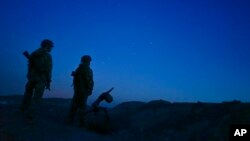Fighting in eastern Ukraine between government troops and Russia-backed rebels eased Tuesday as Russian President Vladimir Putin blamed Kyiv for a week of intense clashes that threatened to unravel a shaky cease-fire.
Putin, on a visit to Russia-annexed Crimea, claimed Ukrainian troops and hardware are massing in the southeast. Russian media quoted Putin as saying he hoped the situation in east Ukraine would not deteriorate into large-scale clashes.
Ukrainian military spokesman Oleksandr Motuzyanyk said for the first time in three days rebel attacks on their positions numbered less than 100.
Motuzyanyk said attacks decreased across most of the front line, but less intense clashes were taking place around the rebel stronghold of Donetsk. He said one Ukrainian soldier was killed and another wounded in the past 24 hours.
Eduard Basurin, a rebel spokesman for the self-proclaimed Donetsk People's Republic, linked the decline to a visit by the Organization for Security and Cooperation in Europe's deputy chief for the Ukraine monitoring mission, Alexander Hug. He is visiting Donetsk city, the rebel stronghold, where four OSCE armored vehicles were torched earlier this month.
This month, Ukraine saw its most heated battles since a February cease-fire was signed.
Basurin claimed 17 civilians were killed and 45 wounded by Ukrainian shelling of rebel territory in the past week. Though rebel numbers could not be immediately and independently verified, artillery clashes overnight left at least nine people dead.
Basurin claimed Ukrainian forces were responsible for the attacks on Mariupol, despite it being under government control. He said he would raise the issue with the OSCE's Hug.
The OSCE says both sides have deployed heavy weapons in violation of the cease-fire deal.
Talk of major offensive
Kyiv and Western governments, including the United States, say the Russia-backed rebels are attacking and have raised fears the rebels may launch a major offensive before winter. Ukrainian officials say thousands of Russian troops are backing the rebels in the territory they control, as well as massing along the border with Ukraine.
Pavel Felgenhauer, a defense analyst and columnist with Novaya Gazeta newspaper in Moscow, said time is running out for an effective military campaign before frozen ground and regular troop rotations. "Well, we are right now just one-half step away from a full-scale war there resuming,” he said. “But, if it will, it would most likely last not very long. Several weeks."
Felgenhauer said Russia and the rebels they support are trying to shift the blame to reduce calls for more sanctions, while factions in Moscow decide what action to take.
"Most likely, the 'party of war' says we should hit the Ukrainian military now, and military victory will mean destabilization and maybe collapse of the present regime in Kyiv,” he said. "And, [the] 'party of peace' most likely says we should not risk that and risk new sanctions. We should wait. Ukraine will disintegrate without a direct military offensive.”
Felgenhauer pointed out, either way, “of course the (Russian) goal is Ukrainian disintegration. At least, disintegration of the present regime and re-formatting of Ukraine."
The renewed hostilities and finger-pointing come just ahead of Ukraine's independence day next week (August 24). Felgenhauer said he is not convinced the tensions are related to the symbolic date, but said “basically, Russia does not want an independent Ukraine." He explained, "Officially speaking, yes, they can be independent as much as they wish, as long as they continue to be a Russian dominion - part of the Russkiy Mir (Russian World)."
Russia seized Ukraine's Crimean peninsula last year, after popular protests led to the fall of Kremlin-backed President Viktor Yanukovych to Western-leaning leaders. Yanukovych fled to Russia and the Kremlin began supporting rebels in Ukraine's east, though it denies the mounting evidence of its military support.
The United Nations estimates more than 6,400 people have been killed since April 2014 when Russia-leaning rebels began taking over government buildings in the east.




